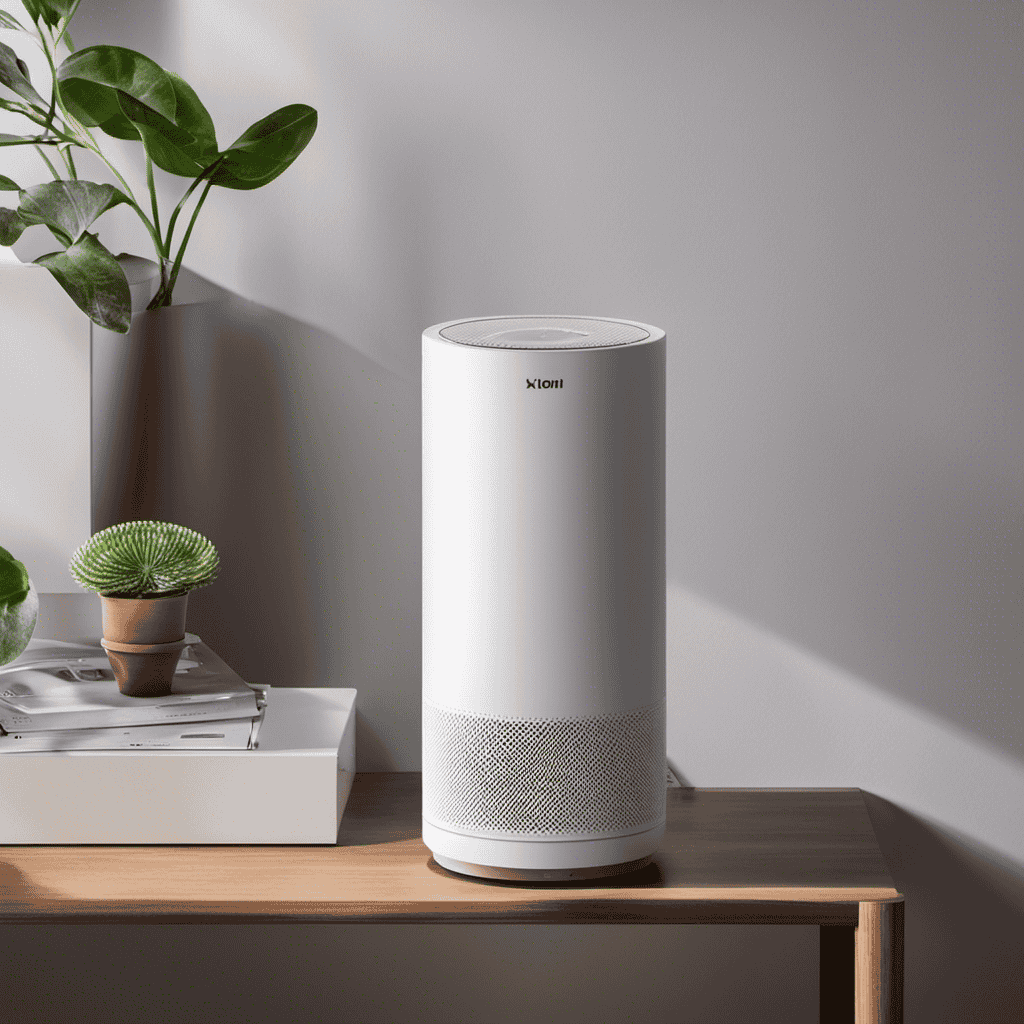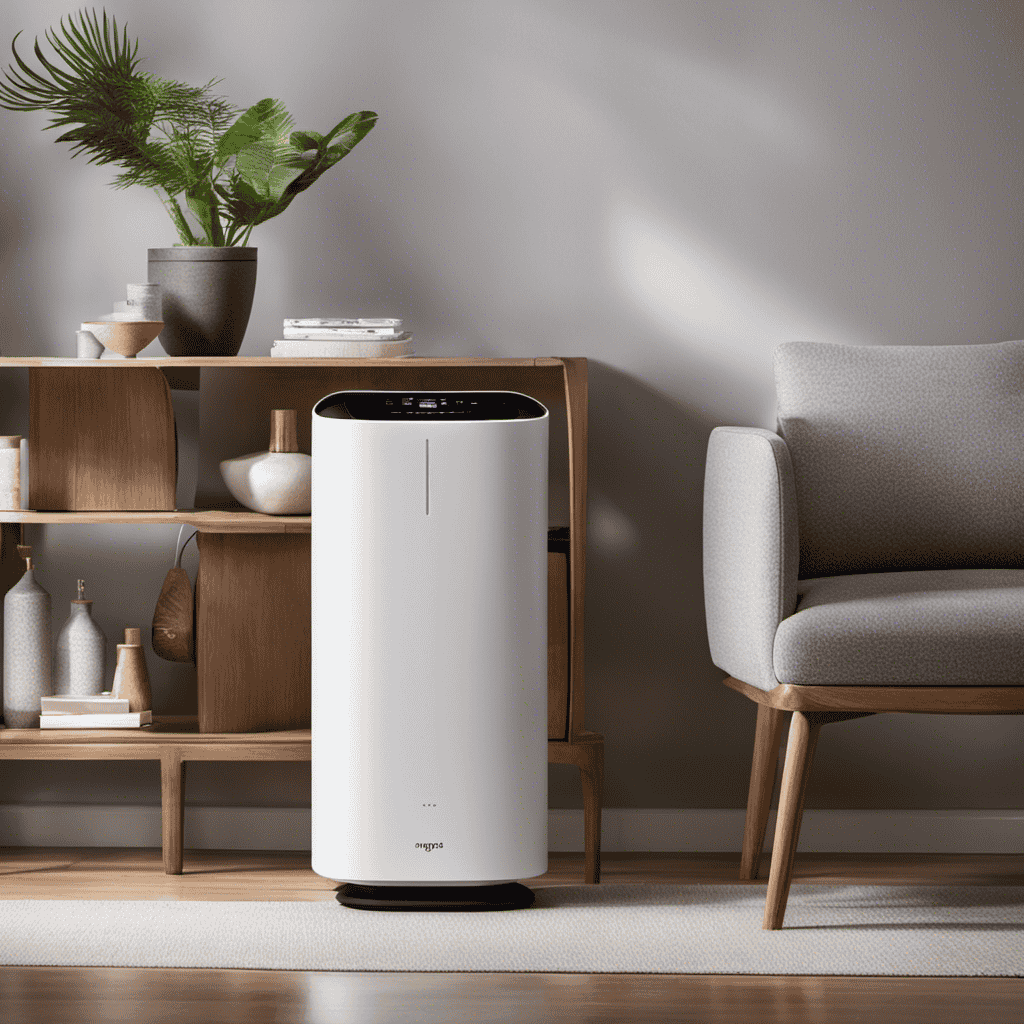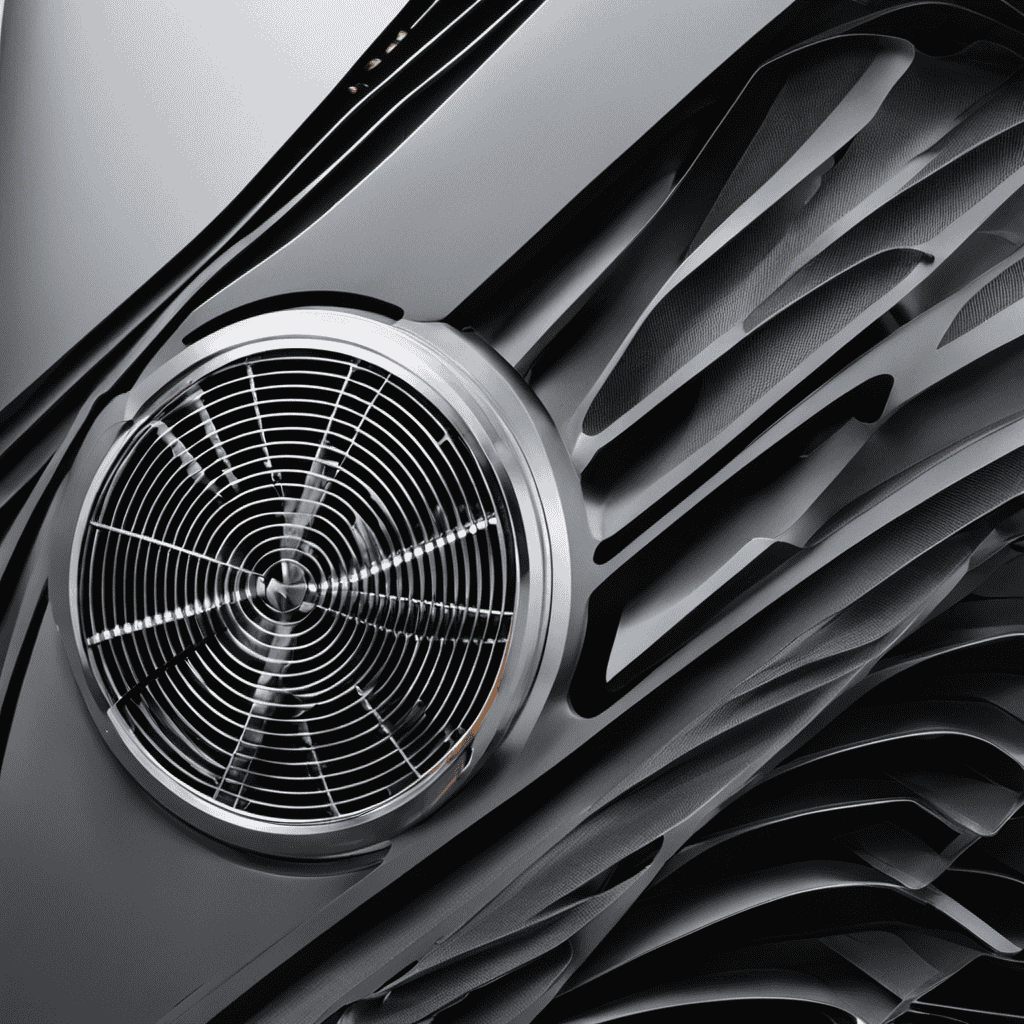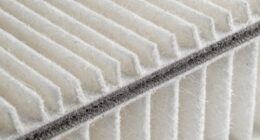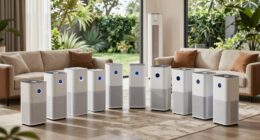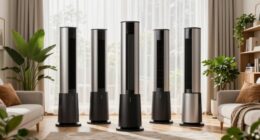I’ve been curious, how long does it take to see the advantages of using an air purifier? Let’s explore the scientific aspect of this.
In this article, we’ll explore the factors that can affect the time it takes to see improvements, the process of air purification, and what changes to expect in your indoor air quality.
Buckle up, because we’re about to discover the wonders of using an air purifier and how it can positively impact our lives.
Key Takeaways
- Factors such as room size, air quality, and the type of air purifier chosen can affect the time it takes to notice the benefits of an air purifier.
- The purification process involves removing contaminants from the air through filtration, with HEPA filters being highly effective in capturing particles as small as 0.3 micrometers.
- The time it takes for air quality to improve depends on factors like space size and the level of contaminants present, but improvements can be noticed within a few days or weeks.
- Using an air purifier can result in immediate air quality improvement, reduction of allergens, elimination of odors, and improved respiratory health.
Factors Affecting Time to Notice Air Purifier Benefits
There are several factors that can affect how quickly you’ll notice the benefits of an air purifier.
The effectiveness of an air purifier depends on various factors such as room size, air quality, and the type of air purifier you choose.
Larger rooms may require more time for the air purifier to circulate the air effectively and remove pollutants.
Additionally, if the air quality in your home is severely polluted, it may take longer for the air purifier to improve the overall air quality.
The type of air purifier you select also plays a role in how quickly you’ll notice cleaner air.
Some air purifiers use filters, while others use ionizers or ozone generators.
Each type has its own unique cleaning process and may take different amounts of time to produce noticeable results.
Therefore, it is important to consider these factors when determining the time required to notice cleaner air with an air purifier.
Understanding the Purification Process
To understand the purification process, it’s important to know how an air purifier works. Air purifiers are designed to remove contaminants from the air, improving indoor air quality. They achieve this through a filtration process that involves trapping particles and pollutants as air passes through the device. The effectiveness of air purifiers in removing different types of contaminants can vary, depending on the specific filtration technology used.
One common type of filtration technology used in air purifiers is High Efficiency Particulate Air (HEPA) filters. These filters are highly effective in removing airborne particles such as dust, pollen, pet dander, and mold spores. HEPA filters work by capturing particles as small as 0.3 micrometers, ensuring cleaner air.
To give a better understanding of how air purifiers work, here is a table highlighting the different types of contaminants and their effectiveness in air purifiers:
| Contaminant | Effectiveness in Air Purifiers |
|---|---|
| Dust | High |
| Pollen | High |
| Pet dander | High |
| Mold spores | High |
How Long Does It Take for Air Quality to Improve
If you’re wondering how quickly you’ll see an improvement in your indoor air quality, it’s important to consider factors like the size of the space and the level of contaminants present. The time it takes for air quality to improve can vary depending on these factors.
However, research suggests that you may start noticing the benefits of clean air within a few days or weeks of using an air purifier. Here are some emotional benefits you can expect to experience:
- Relief from respiratory symptoms such as coughing, wheezing, and shortness of breath
- Reduced allergies and asthma attacks
- Improved sleep quality and overall well-being
- Enhanced cognitive function and productivity
Notable Changes in Indoor Air After Using an Air Purifier
When it comes to using an air purifier, there are several notable changes that can be observed in indoor air quality.
Firstly, immediate air quality improvement is one of the key benefits of using an air purifier. This is because air purifiers are designed to remove pollutants and contaminants from the air, resulting in cleaner and fresher indoor air.
Additionally, air purifiers are effective in reducing allergens, providing relief for those who suffer from allergies or respiratory conditions.
Lastly, air purifiers are also known for their odor elimination effectiveness, helping to remove unpleasant smells and odors from indoor spaces.
Immediate Air Quality Improvement
You’ll notice an immediate improvement in your air quality once you turn on the air purifier. The air purifier works by filtering out pollutants and allergens, leaving you with cleaner and fresher air to breathe. Here are some ways in which you’ll experience the immediate impact of using an air purifier:
-
Reduced allergens: The air purifier traps allergens like pollen, pet dander, and mold spores, providing relief to those with allergies or asthma.
-
Eliminated odors: The purifier removes unpleasant odors from cooking, pets, or smoke, leaving your home smelling fresh and clean.
-
Decreased respiratory irritation: By capturing fine particles and irritants, the air purifier can help reduce coughing, sneezing, and other respiratory symptoms.
-
Improved sleep: With cleaner air, you may experience better sleep quality, waking up feeling more refreshed and rejuvenated.
Investing in an air purifier can make a noticeable difference in the quality of the air you breathe, providing immediate benefits for your health and well-being.
Allergen Reduction and Relief
The reduction of allergens is a major benefit of using an air purifier. Allergens, such as dust mites, pollen, pet dander, and mold spores, can trigger allergies and worsen respiratory conditions.
Air purifiers are designed to capture and remove these allergens from the air, improving indoor air quality and providing relief to individuals with allergies or respiratory issues. By utilizing filters, air purifiers can effectively trap and remove these particles, reducing their concentration in the air we breathe.
This allergen control can lead to significant improvements in respiratory health, reducing symptoms like sneezing, coughing, and wheezing. Additionally, cleaner air can also help prevent asthma attacks and other respiratory complications.
As we explore the benefits of air purifiers, it is important to consider their effectiveness in eliminating odors as well.
Odor Elimination Effectiveness
To effectively eliminate odors, consider the type of air purifier you’re using. Different air purifiers have varying levels of effectiveness in odor removal. It is important to choose one that is specifically designed for this purpose.
When it comes to airborne particle removal, certain air purifiers utilize advanced filtration systems that can effectively capture odor-causing particles and neutralize them. Here are four important factors to consider:
- Activated Carbon Filter: This type of filter is highly efficient in adsorbing and eliminating odors.
- UV-C Light: Some air purifiers utilize UV-C light technology to destroy odor-causing bacteria and viruses.
- Ionizers: These release negative ions that attach to odor particles, causing them to clump together and fall out of the air.
- Ozone Generators: While effective in removing odors, ozone generators should be used with caution due to potential negative impacts on respiratory health.
Understanding how different air purifiers work in eliminating odors can help you make an informed decision.
Now, let’s explore what to expect during the initial days of using an air purifier.
What to Expect During the Initial Days of Using an Air Purifier
During the initial days of using an air purifier, it’s important to keep in mind that results may vary based on the specific air quality conditions in your home. The improvement timeline and initial air quality changes can differ depending on factors such as the size of the room, the level of pollutants present, and the efficiency of the air purifier itself.
Generally, you may start noticing some immediate benefits, such as a reduction in dust particles and pet dander in the air. However, it may take a few days to a couple of weeks to see significant improvements in air quality, especially if there are high levels of pollutants present. It’s crucial to be patient and allow the air purifier enough time to effectively filter and clean the air.
Transitioning into the subsequent section about the long-term benefits of using an air purifier, it’s important to understand that continuous usage can provide ongoing benefits and maintain a healthier indoor environment.
Long-Term Benefits of Using an Air Purifier
Using an air purifier regularly can help improve overall indoor air quality and create a healthier living environment. Here are some of the long-term health benefits you can expect from using an air purifier:
-
Reduction in airborne allergens such as pollen, pet dander, and dust mites, which can alleviate symptoms for allergy sufferers.
-
Decreased exposure to harmful pollutants like volatile organic compounds (VOCs) and fine particulate matter (PM2.5), which can have detrimental effects on respiratory health.
-
Improved indoor air circulation, leading to a decrease in the spread of airborne viruses and bacteria, promoting a healthier immune system.
-
Elimination of unpleasant odors caused by cooking, pets, or smoke, resulting in a fresher and more pleasant living space.
Frequently Asked Questions
Can an Air Purifier Completely Eliminate All Pollutants and Contaminants in the Air?
Yes, an air purifier can effectively reduce pollutants and contaminants in the air, but it may not eliminate them completely. It depends on the purifier’s capabilities and the specific pollutants present.
Are There Any Specific Air Purifier Models That Are More Effective at Removing Certain Types of Allergens or Pollutants?
Are there air purifier models that effectively remove pet dander, pet hair, smoke, and odors? The effectiveness of air purifiers varies, but certain models with HEPA filters can help reduce these allergens and pollutants.
Is It Necessary to Keep Windows and Doors Closed While Using an Air Purifier for Optimal Results?
It is not necessary to keep windows and doors closed while using an air purifier for optimal results. Air purifiers can still be effective with windows open, although some outside pollutants may still enter.
Can Using an Air Purifier Help Reduce the Symptoms of Respiratory Conditions Such as Asthma or Allergies?
Using an air purifier can significantly reduce respiratory symptoms like asthma or allergies. The effectiveness of an air purifier depends on various factors, such as the quality of the device and the individual’s condition.
Are There Any Potential Side Effects or Risks Associated With Using an Air Purifier for an Extended Period of Time?
Using an air purifier for an extended period of time may have potential risks and health effects. It’s important to consider factors like filter maintenance and proper ventilation to minimize any negative impacts.
Conclusion
In conclusion, using an air purifier can provide noticeable benefits in a relatively short amount of time. Studies have shown that air purifiers can remove up to 99.97% of airborne particles, including dust, pollen, and pet dander, within just a few hours of operation.
This significant reduction in indoor air pollution can lead to improved respiratory health and a decrease in allergy symptoms. So, if you’re looking to breathe cleaner air and enjoy a healthier home environment, investing in an air purifier is definitely a wise choice.

